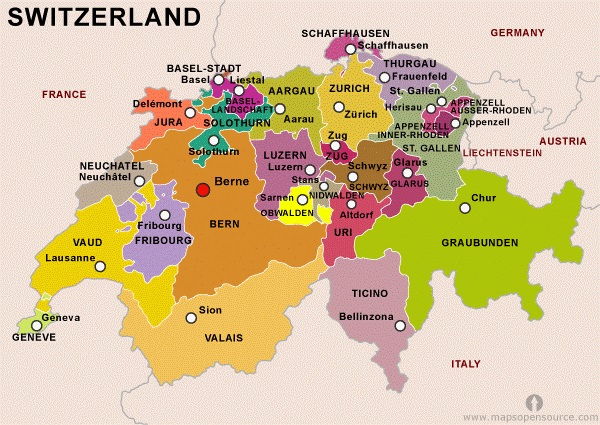Abstract
Switzerland is often held up as one of the most successful examples of a stable federal system. Since its creation in 1848, Swiss federalism has contributed to the country’s stability, as well as its wealth and prosperity. Notwithstanding the generally accepted success of the Swiss experiment with federalism, the Swiss themselves very much relish an opportunity to examine and criticise the federal system. This has even been institutionalised in the form of ‘National Conferences on federalism’ which, when convened every three years, provide a forum for a discussion on the development of Swiss federalism, often focusing on drawbacks and weaknesses as opposed to benefits. For the first time in many years, however, the 2017 National Conference presented federalism in a more positive light. This article briefly details the history and complexity of federalism in Switzerland, discusses the development of the National Conferences and concludes with a discussion on federalism in times of illiberal democracy.
Introduction
Stemming from a subtle yet patiently elaborated balance, recognised as a milestone of the national institutional architecture, Swiss federalism, for approximately thirty years, has come to be increasingly examined, critiqued and questioned. Several reasons explain this evolution, including the ramifications and effects of globalisation, particularly the tendency to favour centralised structures.
In Switzerland, every three years a “National Conference on Federalism” takes place, tasked with facilitating discussions and questioning the system of Swiss federalism. For many years, the future of federalism has been a primary concern for these conference. But, in 2017, for the first time, more answers than questions resulted from the fifth gathering of these conferences. This evolution has to be welcomed because it demonstrates a strengthening both of cantons and federalism in a (global) period of insecurity and uncertainty.
Federalism in Switzerland: A Historical Overview
In 1291 the first three cantons – Uri, Schwyz, and Unterwalden – founded a confederal alliance, although their pact of 1291 makes reference to an earlier ‘antiqua confoederatio’ of 1273. These three original cantons were later joined by all other cantons, one after another. The last three cantons – Geneva, Neuchatel, and Valais – joined as part of the Pact of 1815 following the defeat of Napoleon. Thus it took more than 500 years to complete Switzerland’s integration process. After the short-lived war of the Sonderbund (i.e., modernist Protestants versus the conservative Catholic separatist league) in 1847, the Switzerland, as we know it today, began to take shape. Its foundation rests on the first federal Constitution of 1848, which reflected the outcome of the Sonderbund War as well as the popular revolutions that had swept through Europe at the time.
In 1874 a total revision of the Constitution was undertaken to correct problems with the 1848 version, yet although this was approved by a double majority (the population and the cantons), it did not significantly alter the Swiss system. Although subject to 155 partial revisions, the Constitution has remained in force for 125 years. In 1999, an ‘update’ of the previous text was undertaken to modernise the document and clarify and order the previous 155 revisions. This was adopted by popular vote on 18 April 1999 and entered into force on 1 January 2000. In most basic respects, then, the Swiss political system has remained largely unchanged since 1848.
Although the 1848 Constitution was rejected by eight cantons, due in part to the citizens’ fear of its modernity, it soon acquired full legitimacy. Cantons were able to preserve their individual identities, even a certain patriotism, to the point that they could be considered microstates. On the other hand, as the country was based on a fragile consensus after a war, federal authorities have always (and successfully) taken great care not to upset cantons.

(Maps Open Source 2018)
Why National Conferences on Federalism?
Set up jointly by the Confederation (the Swiss National Government) and the Conference of Cantonal Governments (KdK/CdC), an international Conference on Federalism took place in St. Gallen in August 2002 under the auspices of the Forum of Federations. This event was unanimously considered a success and it was therefore decided, on the initiative of the canton of St.Gallen, that a national level dialogue on the tricky questions regarding federalism should be convened. The organisers of these triennial conferences are, besides cantons who host the meeting, the Federal Council (Government), the Council of States (Upper House of Parliament) and Kdk/CdC, in addition to the top leadership of the country.
The National Conferences on Federalism represent an opportunity to transcend everyday federalism, to evaluate the success of the Swiss system and to highlight new tendencies evolving in the system. More precisely, it is tasked to identify potential opportunities of innovation for federalism, to define possible brakes in the innovation and to participate in the process of political decision-making required for the implementation of the reforms. These regular exchanges at the national level should allow for an improvement of the understanding of federalism in such a way that it should become a daily concern of the political world as well as a subject of public interest.
One of the primary concerns of these conferences is to examine the capacity of cantons to adapt themselves to meet the challenges of the 21st century, particularly the pressures of global trends, the role of the municipalities and the cities in the system, the positive or negative influence of competitiveness and the role of federalism in the everyday life of Swiss citizens.
To date, five conferences have been organised. The themes of the conferences, however, reveal a certain ‘anxiety’, perhaps better described as ‘a fear of tomorrow’. Federalism is shown as fragile, subject to unprecedented problems, concerns and thus an uncertain future:
Fribourg (2005) – ‘Cooperative Federalism: Facing New Challenges’
Baden (AG, 2008) – ‘Swiss federalism under the Pressure of Efficiency’
Mendrisio (TI, 2011) – ‘Federalism and the New Territorial Challenges: Institutions, Economy and Identity’
Solothurn (2014) – ‘Federalism: Questioning Cohesion and Solidarity’
Montreux (VD – 2017) – ‘Will Switzerland Still Be Federal in 50 years?’
National Conferences and Global Criticism
Switzerland is a highly democratic country in which experts, but also citizens, relish the opportunity to criticise the system. The criticisms addressed to federalism focus traditionally on five concerns, oft-considered as almost insurmountable challenges, among others by Prof. Adrian Vatter[1]
- Cantons are too small and present too many differences between them (ratio 93-1 concerning population between Zurich and Appenzell Inner-Rhoden).
- The political territories of citizenship match less and less often the functional spaces of studies or work because of increasing mobility and pendularity.
- The proliferation of parallel structures (760 inter-cantonal agreements called “concordats”, 500 inter-cantonal “conferences” to date) complicates the management of the country.
- The advantages granted to the losers of the Sonderbund Civil War are too generous and give too much weight to the small Catholic cantons like Obwalden, Nidwalden, Appenzell, Lucerne, Zug or Valais.
- Linguistic tensions have not been tempered, in particular in German-speaking Switzerland where French and English fiercely compete.
Some questions, therefore remain: How to deal with these critiques in the context of contemporary Swiss federalism? How far is it still wise to take them into account? Does it mean the opening of an era of reform or just a masochist syndrome which gives arguments for all detractors of federalism?
The extreme fragmentation of power in the country means that we do not have a kind of “Great Helmsman” who consistently instil a feeling in the citizenry that we are the best and that we need to make Switzerland great again (although, this is a role the right-wing Swiss People Party has tried to play). Usually, a Protestantism inspired modesty guides the authorities, who are open to crackpot theories, like cantons’ merging. This was very clear during the 2011 and 2014 Conferences.
The Montreux 2017 Fifth National Conference
The theme of the fifth Conference sounds particularly provocative: Will Switzerland still be federal in 50 years? As usual, just before the opening of the fifth Conference, the daily newspaper “Le Temps” published a rather controversial article written by Yelmarc Roulet under the title “Unbalanced Federalism”: “Even if it showed its relevance for 170 years, the model of the Swiss federalism shows increasing weaknesses […] The 5th national Conference […] highlights both the inadequacies of the system as the difficulties in retouching such fragile mechanics […] The institutional consideration of urban Switzerland, through a special status for cities, a reform of the Council of States assuring their presence, remains a crucial stake face in which you should not give up”.
But in contrast to previous Conferences, discussions in Montreux brought to light a different vision of Swiss federalism. Numerous speakers underlined that the institutional construction of Switzerland satisfactorily functions and that the vague desires of in-depth reforms, predominantly evoked during the last decades, are not really on the agenda any more. They have reaffirmed with a vibrant consensus that Swiss federalism is not overburdened by current stakes, and that, on the contrary, it constitutes a factor of competitiveness and prosperity. In a nutshell: the potential imperfections of Swiss federalism are considered as an enrichment rather than an impoverishment.
Among others, the German-speaking geographer and political analyst Michael Hermann, expressed with a peculiar scientific clarity this change of paradigm. He sees in the visible inadequacy of the federal system not a source of weakness, but an opportunity to show in particular that the internal historic borders, can have well and truly an integrative strength and as such avoid tensions which can be located in other (quasi)-federal systems such as, Belgium or Spain.
He makes a similar positive report about the differences of size: they have the strength of the disproportions, oppose unifying planning and incite to look for simple and flexible solutions, adapted to the diversities of the current society.
Concerning cities, which seemingly do not wish to be treated like other municipalities, they should understand that their inhabitants, their citizens and their authorities enjoy overproportioned power and real relative advantages. The first is the fact that (contrarily to “normal” municipalities) they are able to enjoy a professional political and administrative staff, better trained in the management of a community than the volunteers of a system of militia which suffers from an increasing lack of incumbents.
Michael Hermann concluded his statement with the beneficial opportunity to cultivate the asymmetries and the differences of all kinds, to increase the general feeling of the necessity – and the collective capacity – of finding simple, adapted, flexible and resistant solutions. He also underlined the importance of multiple and cross-cleavages (linguistic, geographical, and financial) which allow varying minorities and majorities while preventing the confrontation of compact blocks.
Speaking on behalf of cities, the Mayor of Lausanne, Grégoire Junod expressed a similar viewpoint. For him, it is better to give up laborious institutional reforms, aiming for example at the creation of a special status for the big urban districts, and to instead opt for a pragmatic approach, such as a concerted action of cities for the solution of the problems which specifically concern them.
For the first time, officials and experts have sung the praises of federalism which – among other advantages – contributes to the prosperity of Switzerland and to the competitiveness of its economy, as underlined by a recent study established for Fondation.ch and the Union of the cantonal Banks. Prof. Stéphane Garelli, a renowned specialist of international comparisons on this topic, confirmed that processes of large scale centralisation of power has a demobilising effect on the people in charge of political responsibilities. In practice, long-distance management is a dangerous illusion maintained by the telecommunication technologies, which represents a considerable risk. On the contrary, the closeness which characterises federalism constitutes an asset and allows the experimentation of adequate solutions for the management of conflicts on an adequate scale.
In this sense, federalism represents the real strength of Switzerland. Indeed, this was asserted in the “Declaration of Montreux” signed by most participants, and echoes (either explicitly or implicitly) the eponym document published on August 23 1947 by the representatives of the “Universal Movement for a world Confederation”.
Federalism in a Time of Illiberal Democracy
At a time where in so many countries there are tendencies towards “strong governments” and illiberal democracy, one should insist on the advantages of federalism. The latest national Conference in Switzerland has proven that even scientifically it is possible to change its point of view in order to be less critical.
Federalism creates an (endless) dialectic movement between centralisation and decentralisation. Therefore, there is a constant adaptation to changing times and circumstances. The two first federations, United States and Switzerland, belong to the most stable countries in the world, but seemingly also to the most modern countries: this is the result of federalism’s ability to easily evolve and adapt.
There is no real need for big changes or federal revolutions. The simple fact that federalism involves many partners at different levels makes change more difficult to realise, even if there is political will. Insisting too much on the necessity of changes in the federal structure can give arguments to all those politicians who constantly oppose any form of decentralisation. Why should we claim all the time that federalism always faces challenges and needs reform? Why not, on the contrary, spend time and money to study all the advantages it gives to the small amount of federations in the world?
The change of paradigm that we are (perhaps!) experiencing in Switzerland could encourage specialists to concentrate their research on the beneficial dimension of federalism and all the advantages it can bring to political management.
The Necessity to Defend and Promote Federalism
Fundamentally, the fifth national Conference underlined that main effect of Swiss federalism is to create strong political stability. This stability results in a strong and stable economy and is a factor in the attraction of foreign companies to Switzerland. This asset must not be underestimated, particularly at a time when some European States (not to speak of extra European States) are shaken by centrifugal (because unanswered) community claims. Moreover, federalism implies the possibility for dialogue with authorities which are geographically and culturally in touch with their citizens’ needs, capable of understanding the problems and the needs for companies settled on their territory.
The study of federalism should concentrate on its success rather than on its failures. It should also avoid the notion of “continual change”. Opponents to federalism like to claim that it is a complicated system in constant need of reform, not to mention that is costs a lot, in terms of both effort and money (what is obviously not the case). In researching and demonstrating scientifically how federalism is a better system of government than the others, it could perhaps inspire other countries, experts or politicians, and prove its opponents wrong. A good place to start, would be to point out that federalism is not a kind of nonsensical ravings, but provides structures to nurture the link between political stability and economic success.
Suggested citation: Schmitt, N. 2018. ‘Switzerland in 2018 – The Rebirth of Federalism?’. 50 Shades of Federalism. Available at: http://50shadesoffederalism.com/case-studies/switzerland-2017-re-birth-federalism/
Bibliography
Belser EM (ed) 2015, States falling apart? – Secessionist and autonomy movements in Europe, Stämpfli, Bern.
Chenaux JP (éd.) 1999, La Suisse éclatée: quand les “fusiologues” jouent avec le feu, Centre Patronal, Lausanne.
Feld LP & Schaltegger CA 2017, Föderalismus und Wettbewerbsfähigkeit in der Schweiz, NZZ Libro, Zurich; French version available from here and English version “Federalism and Swiss Competitiveness” available from here.
Hermann M 2016, Was die Schweiz zusammenhält: vier Essays zu Politik und Gesellschaft eines eigentümlichen Landes, Zytglogge, Basel.
Iff A & Stadelmann-Steffen I 2011, Switzerland: insights into a paradigmatic federation, Forum of Federations, Ottawa.
Further Reading
Belser EM / Hänni P / Waldmann B (eds), Föderalismus 2.0 – Denkanstösse und Ausblicke / Fédéralisme 2.0 – Réflexions et perspectives, PIFF, Stämpfli Vergag, Bern 2011.
Mueller, S. ‘Switzerland: Federalism as an Ideology of Balance’ in Gagnon, A.G. Keil, S. and Mueller, S. Understanding Federalism and Federation, Ashgate.
Mueller, S. and Vatter, A. ‘Federalism and Decentralisation in Switzerland’ in Ferdinand Karlhofer and Günther Pallaver, Federal Power-Sharing in Europe, 2017.
Reflets de la 5e Conférence nationale sur le fédéralisme / Rückblick auf die 5. Nationale Föderalismuskonferenz, Office des affaires extérieures du canton de Vaud, Lausanne 2017.
Waldmann B, Belser EM, Wiederkehr R (eds), Staatsorganisationsrecht, Schulthess Verlag, litera B, Zürich 2017.
[1] See. Among others Adrian Vatter (ed.), Föderalismusreform – Wirkungsweise und Reformansätze föderativer Institutionen in der Schweiz, Verlag Neue Zürcher Zeitung, Zürich 2006.


